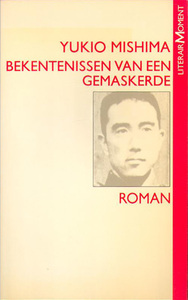Take a photo of a barcode or cover
fast-paced
dark
mysterious
reflective
slow-paced
Plot or Character Driven:
Character
Loveable characters:
No
Flaws of characters a main focus:
Yes
The narrator is very human in his contradictions-- who has not faced doubt, like he has? Mostly, the novel gives an intense and morbid look into the intimate details of the narrator's life, his fascinations with death and his own sexuality, and the ways in which they are linked. It's a very intense and introspective novel, worth a read, especially if you're interested in post-war queer lit. The ending is not the one you might expect from a novel about death and a queer man in WWII, but was a good fit all the same.
Graphic: Violence
Moderate: Gore, Sexual content, Suicidal thoughts
challenging
dark
emotional
sad
tense
slow-paced
Plot or Character Driven:
Character
Strong character development:
No
Loveable characters:
Complicated
Diverse cast of characters:
Complicated
Flaws of characters a main focus:
Yes
Confessions of a Mask by Yukio Mishima is a 1950s novel which has been assumed to be something close to an autobiography of the author, with themes of dealing with his sexuality, violence and conflicts of modernism and traditionalism at its core. Despite the fictional settings, academics along with friends of Yukio believe this to be a reflection of his thoughts, and to quote the title, it was him revealing the face behind his mask.
Set during and post-World War II and putting the novel in the context of Yukio’s traditional and right-wing political beliefs, this book reflects Japan’s ‘coming of age’ through a male adolescent who is going through the same. After Japan’s defeat, there was mass social change in their society, with a very prominent gay and trans scene emerging, huge waves of commercialisation and westernization, as well as the freedom that came from being liberated from its oppressive imperialism. This setting somewhat juxtaposes Kochan’s experiences of attempting to accept his sexuality, mainly because of the direct link to possession, violence and suicide that comes with his attraction to men.
Having read a couple of Yukio’s novels, such as The Sound of Waves and The Sailor Who Fell From Grace with the Sea, I really wasn’t prepared for the sheer violence and graphicness in the novel – you can really tell this book is very important to the author and there’s a new layer of emotion that I hadn’t yet read from him. It was often a little jarring, especially when paired with more old-fashioned styles of writing, which one might see as dated, and the lack of dialogue. Because of the nature of the book, the entire novels feel like a soliloquy, which is brilliant masterpiece, but definitely not for everyone.
The reason for calling this book a masterpiece is because I think it brilliantly depicts Yukio’s thoughts in a succinct manner, he’s being truly intentional with his words and is keenly aware of how bizarre they may sound to someone else. The isolation Kochan feels in his discovery of his sexuality as well as attempting to navigate a normal persona and plan his normal life with wife and children is heartbreakingly painful but speaks truth for many queer people during this period.
Overall, while this book is most certainly very odd and different, with strong-handed sexism throughout, I think it is worth ignoring those subtleties for the wider picture and exploring the thoughts of the author through this character.
Graphic: Body horror, Child abuse, Chronic illness, Death, Homophobia, Mental illness, Misogyny, Sexism, Sexual content, Sexual violence, Suicidal thoughts, Blood, Death of parent
emotional
reflective
slow-paced
Plot or Character Driven:
Character
Strong character development:
Yes
Loveable characters:
Complicated
Diverse cast of characters:
No
Flaws of characters a main focus:
Yes
Graphic: Sexual content, Violence
Very interesting book, mainly because of the narrator. He's not your normal protagonist, and I really liked that part of this novel. It was a good insight into a different type of person and how someone such as himself would think.
a beautuful insight in Yukio Mishima's world and style.
the finale, for me, is a bit disappointing, because it's open and ambiguous.
but it was a characteristic of all the books of those years.
we don't really now what is going to happen between the two protagonists.
the finale, for me, is a bit disappointing, because it's open and ambiguous.
but it was a characteristic of all the books of those years.
we don't really now what is going to happen between the two protagonists.
Mishima is brilliant. I am already looking up and deciding which of his books to read next (any suggestions are more than welcome!) It perfectly illustrates the inner conflict of a person struggling with their sexuality and identity, and a lot of it resonated with me as a queer person.
An interesting and mostly disheartening insight into the emotions of a sadomasochist homosexual boy in Japan. Definitely glad I read it, and it brought up some interesting ideas re war, masculinity, and homosexuality. Overall, though, I was expecting something more visceral and the middle section was kinda boring.
reflective
medium-paced
Plot or Character Driven:
Character
Strong character development:
Complicated
Loveable characters:
Complicated
Diverse cast of characters:
Complicated
Flaws of characters a main focus:
Yes







